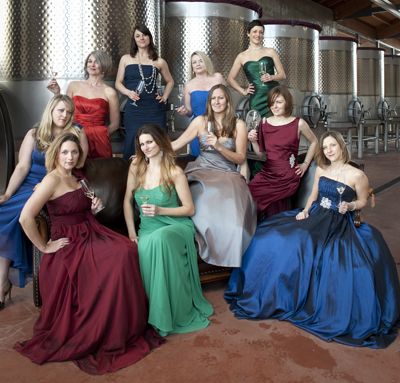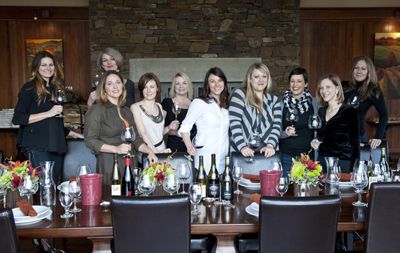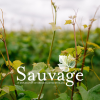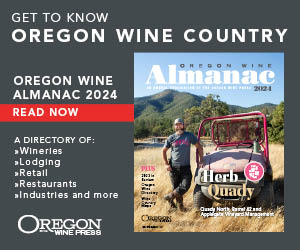Women of Taste


Story by Jennifer Cossey / Photos by Andrea Johnson
Graceful, powerful, sophisticated, lively and bright are words used not only to describe wine but also the women who love to sell, teach, write and learn about it. Female sommeliers have assumed a role across the country as leaders in their industry. They have chosen a career in a field traditionally dominated by men, and they have not only found a way to exist in it but also to succeed.
Oregon plays host to a wealth of talented female sommeliers helping to spearhead this movement. Among them are Caryn Benke, Tia Hubbard, Toni Ketrenos, Erica Landon, Dana Frank, Gaironn Poole, Savanna Ray, Carrie Stigge and Gretchen Allen-Wilcox. As a trained sommelier myself, working at Soléna and Grand Cru Estates Winery, I am honored to be included among these extraordinary women in regards to education, training and passion for the product we have decided to make not only our career but also a lifestyle.
Sommeliers across the country, particularly in Oregon, have had a hard time finding traditional jobs. The current economic challenge has made it an even more difficult prospect, and the role of sommelier is changing from working exclusively in restaurants.
Sommeliers, especially female ones, have reached into many other avenues to stretch their wings and share their knowledge. You will still find some in more customary positions where they manage wine lists, educate their staff and provide table service for patrons. More frequently, though, you will find them in a variety of other occupations, working as retail buyers or in sales-focused roles with distributors or suppliers. Some are in wineries, providing a new level of knowledge and quality to sales, marketing and hospitality. Still others, while pursuing the above, having heard the siren call of entrepreneurship, are starting their own business ventures.
Many of these women began their careers as do most sommeliers, in the classic incubator for this precious art: the restaurant. Most had a “eureka “ moment with the one wine that made them turn their head, try it again and become forever captivated.
For Savanna Ray, sommelier at Wildwood Restaurant in Portland and an educator for the International Sommelier Guild, it was Didier Dagueneau’s Pur Sang. “I was transported to another planet. I thought to myself that if wine could be like this that I had to taste them all.”
Carrie Stigge, direct sales manager for Rex Hill and A to Z Wineworks, also had a similar experience. While living in Italy, “a friend ordered an Amarone to accompany our meal. It pushed me to want to learn more, and I soon realized that I could turn this longtime passion into a career.”
For others, their enthusiasm grew out the support of a trusted teacher. Toni Ketrenos, corporate wine buyer for New Seasons Market, remembers her first wine job at Rex Hill Winery working for Lynn Penner-Ash.
“It was a great gig – evenings, weekends, summers, and I learned something every day,” Ketrenos said. “Working crush with Lynn was what made me decide to want to work in the wine business full time. She nurtured my curiosity and interest in wine from the start.”
Mentorship and peer support are invaluable to a budding career, and there certainly seems to be a positive correlation between the strong presence of female sommeliers in Oregon and their proximity to successful female personalities in wine production.
“Women who make wine open doors for the rest of us,” said Tia Hubbard, sommelier for Gino’s Restaurant in Sellwood. “It’s the reason that there are so many more women working in the business on the West Coast than in the rest of the country.”
Dana Frank, direct consumer sales manager for Bethel Heights, agrees with Hubbard’s sentiment. “I think there is great applause for women working in wine in Oregon who have contributed so much to the positive perception of females in the industry.”
“Where do you go to school for that?” is one of the most frequently asked questions of any sommelier, and it’s a good one to ask. Topping the list of the most important elements to the growth and success of these women’s careers has been their wine education. Not only has it given them confidence and credibility but also provided the foundation around which they are building their careers and reputations.
Erica Landon, educator for the International Sommelier Guild and partner in business ventures Dirt and Walter Scott Wines, was named Portland Monthly’s “Best Sommelier” in 2008. She credits her extensive education for her success. “I would not be where I am today without it. It provided me with the tools to speak eloquently and share my passion for wine with others.”
But as in any other degree, certification is no guarantee of success, let alone a job. Longtime sommelier Gretchen Allen-Wilcox, currently the sales manager for Foris Winery, believes it takes more than simply accreditation to succeed.
“I would be lying to you if I told you the education alone will give you a career,” Wilcox said. “It won’t. There are a lot of unemployed certified wine people out there. It still comes down to the person and their ability to work well with others.”
There is a wealth of options to choose from when making a decision about education in wine. These women are clear examples of that. Some sommeliers, such as Stigge and me, studied through both the Court of Master Sommeliers and the Society of Wine Educators. Each program has certain educational elements but for the most part the study is self guided. The less structured format of the Court was also attractive to Wilcox and Frank.
“I loved that I could self-study, opposed to taking courses,” Frank commented. “In a way, it pushed me to read more and taste wine all the time.”
Wilcox recalls with amusement the moment she learned about the Court of Master Sommeliers. “One day, I was setting up the patio at my restaurant. One by one, various men in beautiful suits started walking by my patio, and many of them were crying — I couldn’t figure it out; I thought maybe there was a funeral. Finally, one gentleman was practically doing cartwheels; when I commented on his happiness, he shouted, ‘I’m a Master Sommelier!’ It was an emotional gut check, as I realized anything that would make grown men cry in public was something I needed to have.”
Two other more formally structured paths are the Wine & Sprits Education Trust (WSET) and the International Sommelier Guild (ISG). Ketrenos decided on the WSET, attracted by both the structure and the additional emphasis on wine business and marketing. Caryn Benke, wine educator for the McMenamins’ network of properties, and Gaironn Poole, sales representative for Galaxy Wines, as well as Ray, Landon and Hubbard, all took the ISG route.
“I chose to pursue my wine education through the ISG because I was drawn to the classroom atmosphere of the education,” Benke said.
For some, the perception seems to be that women in the wine business have to work twice as hard as men to get the same amount of respect.
“I’ve always felt I had to work a little harder and prove myself a little more,” Ketrenos said. “Not only because I’m a woman, but also because I’m only 5 feet, 2 inches.”
The other side to the story is that many people are more comfortable buying wine from a woman. The warmth and approachability most women bring to their position put people at ease, making buying decisions both relaxing and fun. Female sommeliers across the country are feeding a growing population, hungry for information but put off by the sommelier appearance and pretense of the past.
“We are just as smart and serious as our compadres, but I think that we bring a certain lightness to the career,” Ray commented. “I think that women have a special ability to do that.”
Poole agrees, “We bring a certain charm tableside.”
While women have made great strides creating a successful foothold in the industry, there is still a long way to go.
“I certainly feel like women have gained a lot of respect in our industry, but I think there will always be challenges since the perception is still that this is a male-dominated business,” Frank said.
“I think that the perception as a whole is good,” Stigge noted. “I would say that others in the industry know that women have a better sense of smell and taste than men on average.”
“Perhaps as a female, it’s easier to gain access to a table. It feels more like a conversation than a sales pitch,” Hubbard added. “Even the old school types can be softened and won over, even though they didn’t start out that way.”
While the paths of these similarly trained women have taken a broad range of directions, there is a common intersection in their hope for the future. The faded, antiquated image of a older, stately male sommelier in a starched tuxedo has been replaced with that of the dress-and-heels-wearing wine director, standing tableside, brimming with creative suggestions about what new wine will go impressively well with your meal, as well as the jeans-and-muck-boot-wearing, notebook-toting sommelier in the vineyard, smelling dirt and asking questions.
Landon looks forward to the day when we will no longer be asked how it feels to be a woman in an industry. “My hope is we have moved past that, and we are all considered on our accomplishments and knowledge.”
Ketrenos added that she would like to see more “advancement in the upper levels of the business at the big companies and with larger distributors.”
These women are excited about educating future sommeliers and relish their roles as teachers. “I think my generation is in a good place, and I look forward to helping the next batch of ladies come through,” Poole commented.
For women out there beginning to build their careers as sommeliers, we would uniformly like to offer the following advice: Have confidence in your abilities, be ready to work hard and study harder, have a great time, make friends, remember why you came to this industry in the first place and, above all else, drink lots of wine and train your palate.
“Trust your own palate,” Benke said. “At the end of the day that is what makes you stand out; it’s what makes you unique. Anybody can learn about wine and memorize regions and laws, but your palate is your own signature.”
“Work hard, pay attention and believe in yourself,” Hubbard added. “Make sure to create great friendships with other women in the business; you will be each other’s biggest assets.”
Aside from an education and a strong personal and professional support system, the two most important tools for a female sommelier are a great corkscrew and an even better sense of humor. I can’t speak to their corkscrews, but from my experiences with these ladies, I know they possess the latter in spades.
Unapologetically feminine and professionally steadfast, these women have succeeded through drive, dedication, training and respect for the business. As leaders in their industry, along with a strong force of female winemakers, writers, photographers and other wine professionals in the valley and abroad, they have blazed a trail for others to follow. These women have worked hard to take gender out of the profession while retaining their inherent femininity.
They are proud of being women in their field but look forward to seeing gender become the least important factor in their careers. They are the next generation of mentors, and they wear that task proudly on their rolled-up sleeves. With accomplishment and recognition, they are starting to bring a change to the perception and reality of what a sommelier is and what she can become.
Jennifer Cossey currently works at Soléna and Grand Cru Estates doing marketing, sales and events coordination. She discovered her interests in wine while living in California and has since worked in a variety of capacities in the wine industry over the last 12 years.








